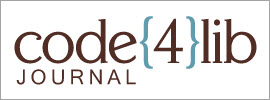Enhancing Print Journal Analysis for Shared Print Collections
CDL’s WEST group published a paper in Code{4}Lib Journal; abstract and links are below.
- ******
Abstract: The Western Regional Storage Trust (WEST), is a distributed shared print journal repository program serving research libraries, college and university libraries, and library consortia in the Western Region of the United States. WEST solicits serial bibliographic records and related holdings biennially, which are evaluated and identified as candidates for shared print archiving using a complex collection analysis process. California Digital Library’s Discovery & Delivery WEST operations team (WEST-Ops) supports the functionality behind this collection analysis process used by WEST program staff (WEST-Staff) and members.
For WEST, proposals for shared print archiving have been historically predicated on what is known as an Ulrich’s journal family, which pulls together related serial titles, for example, succeeding and preceding serial titles, their supplements, and foreign language parallel titles. Ulrich’s, while it has been invaluable, proves problematic in several ways, resulting in the approximate omission of half of the journal titles submitted for collection analysis.
Part of WEST’s effectiveness in archiving hinges upon its ability to analyze local serials data across its membership as holistically as possible. The process that enables this analysis, and subsequent archiving proposals, is dependent on Ulrich’s journal family, for which ISSN has been traditionally used to match and cluster all related titles within a particular family. As such, the process is limited in that many journals have never been assigned ISSNs, especially older publications, or member bibliographic records may lack an ISSN(s), though the ISSN may exist in an OCLC primary record.
Building a mechanism for matching on ISSNs that goes beyond the base set of primary, former, and succeeding titles, expands the number of eligible ISSNs that facilitate Ulrich’s journal family matching. Furthermore, when no matches in Ulrich’s can be made based on ISSN, other types of control numbers within a bibliographic record may be used to match with records that have been previously matched with an Ulrich’s journal family via ISSN, resulting in a significant increase in the number of titles eligible for collection analysis.
This paper will discuss problems in Ulrich’s journal family matching, improved functional methodologies developed to address those problems, and potential strategies to improve in serial title clustering in the future.
By Dana Jemison, Lucy Liu, Anna Striker, Alison Wohlers, Jing Jiang, and Judy Dobry
https://journal.code4lib.org/ (Issue 51, June 14, 2021)
https://journal.code4lib.org/articles/15649 (article link)

